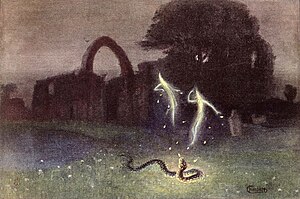Lewis Carroll is the professional pen name of the English Author Charles Dodgson (27 January 1832 – 14 January 1898). Dodgson is a classic polymath, excelling as a poet, a mathematician, a photographer and a fine-line artist. His most famous and popular work is Alice’s Through the Looking Glass, though I think I prefer his so-called nonsense poems, Jabberwocky and the Hunting of the Snark.
The Snark story comprises eight poems that together form a magical and ever-winding thread. Carroll painfully and beautifully describes these eight as “An agony in Eight Fits”: The Landing, The Bellman’s Speech, The Baker’s Tale, The Hunting, The Beaver’s Lesson, The Barrister’s Dream, The Banker’s Tale and The Vanishing. One could start with any of these poems but today and now I pick out The Barrister’s Dream1:
The Barrister’s Dream
They sought it with thimbles, they sought it with care;
They pursued it with forks and hope;
They threatened its life with a railway share;
They charmed it with smiles and soap.
But the Barrister, weary of proving in vain
That the Beaver’s lace-making was wrong.
Fell asleep, and in dreams saw the creature quite plain
That his fancy had dwelt so long.
He dreamed that he stood in a shadowy Court,
Where the Snark, with a glass in its eye.
Dressed in gown, bands, and wig, was defending a pig
On the charge of deserting its sty.
The Witnesses proved, without error of flaw,
That the sty was deserted when found:
And the Judge kept explaining the state of the law
In a soft under-current sound.
The indictment had never been clearly expressed,
And it seemed that the Snark had begun,
And had spoken three hours, before anyone guessed
What the pig was supposed to have done.
The jury had each formed a different view
(Long before the indictment was read),
And they all spoke at once, so that none of them knew
One word that the other had said
“You must know – ” said the judge: But the Snark exclaimed “Fudge!
That statute is obsolete quite!
Let me tell you, my friends, the whole question depends
On an ancient manorial fight.”
“In the matter of Treason the pig would appear to have aided but scarcely abetted:
While the charge of insolvency fails, it is clear,
If you grant the plea ‘never indebted’.
“The fact of Desertion I will not dispute:
But its guilt, as I trust, is removed
(So far as relates to the costs of the suit)
By the Alibi which has been proved.
“My poor client’s fate now depends on your votes”
Here the speaker sat down in his place,
And directed the judge to refer to his notes
And briefly sum up the case.
But the judge said he never had summed up before;
So the Snark undertook it instead,
And summed it so well that it came to far more
Than the Witnesses ever had said!
When the verdict was called for, the Jury declined,
As the word was so puzzling to spell;
But they ventured to hope that the Snark wouldn’t mind
Undertaking that duty as well.
So what is this allegory all about? I will leave that to your own glorious imagination dear reader. Though as the Hatter almost said to Alice, “It means whatever you would like it to mean young lady2.”
1 The poem links nicely into the penultimate poem The Banker’s Tale, and acts as a prelude to this latter poem
2 Though see also Seth et al on this point.
